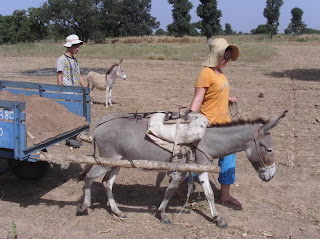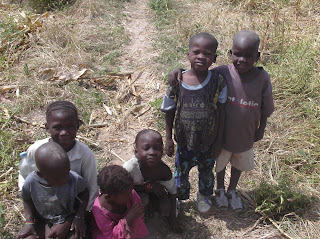
So, first thing's first. Don't research Karadjé. Research Karadie. That's how it was spelled on the sign next to the highway, on the sides of the donkey carts, and in the school. They pronounce it "Karadjé", but it's not the correct spelling, and if you research "Karadie", you get better results. Canada World Youth either misspelled the name, or it has a different spelling in French than it does in Bambara. Okay, go! I was wrong about us being a necessary research tool. All you needed was this bit of information, and now you don't need me anymore.
Slight exaggeration. I'm willing to get a bit competitive with the other sources. Might as well not put CWY's misspelling to waste.
I want to start off with a little precaution: Quebec-Mali is THE most difficult Canada World Youth Exchange. And not only is it the hardest exchange, but you're going into the harder of the two groups in that exchange. You will be living in a smaller village than the other group, with a population of 800 adults and a total population of 2000, and you will not have access to electricity.
Don't let this discourage you, though. The greater the challenge, the greater the reward. This specific exchange may just be the best Canada World Youth has to offer in terms of developing cultural awareness and diversifying perspective, which makes it incredibly relevant to the vision of the program. And don't let your imagination run away with you. CWY wouldn't send you somewhere you couldn't handle. It'll be difficult, and worth bragging about, but it will be manageable.
Climate


There are three seasons in Mali: wet season, cold season, and hot season. The Quebec-Mali exchange is designed so that the Malians are in Canada at the hottest time of the year, and the Canadians are in Mali for the coldest time of the year. In this way, nobody is taken too far out of their comfort zone. Difference is, the Malians start during the hottest point in the Canadian phase, and get weaned into the colder temperatures as they adapt. You will start at the hottest point of your exchange, without getting an opportunity to adapt. You start your phase at the tail end of wet season, and move into cold season.
Coming into the program, I thought that there wouldn't be much difference between seasons, because Mali is so close to the equator. I was wrong. When you arrive, it will be humid, rainy, and always hot. As you progress, it will become dry, it will never rain, and at night, you will be cold.
Be prepared to drink a lot of water, especially at first. It's recommended that you drink four to eight litres every day. I averaged five or six, and more than once got up to nine. But don't worry, you will have as much water as you want. Just make sure you bring a lot of water purifier.
Now, on the other end of the scale, and as weird as it sounds.... Pack for cold weather. When I said cold season got cold during the night, I didn't mean pleasantly cool. I meant, you'll be wearing a sweater, sitting by a fire, and complaining about how cold it is. You'll still be wearing shorts and a T-shirt by day, though. The night-time temperature fluctuates far more with the changing season than the day time temperature.
Food
As far as the food goes, don't worry about quantity. Just like with the water, there will be more than you can handle.
For our breakfasts, we got instant coffee with little triangle breads. We also got this porridge made from corn while it was in season, and then millet later on.
For lunch, it was either rice and sauce, or something called toh. The rice would come with a gumbo sauce, green sauce, or peanut sauce. Toh is sort of a pastry that you rip pieces off of and dunk in sauce. Toh would come with a fish sauce, gumbo sauce, or red sauce.
For dinner, you could get rice or toh again, but you might also get spaghetti, potatoes with a sort of sweet sauce, or... French fries. Apparently French fries are a traditional Malian dish.
Malians eat with their hands, but we were provided with our own plates and utensils. Generally, Canadians had a difficult time adjusting to the food, and almost everyone lost weight during the Malian phase. You might consider taking some Canadian food with you to the village, to eat sparingly, which makes the adaptation process easier.
Language
Bambara is the dominant language by far, but there are people that speak French scattered here and there. French has had some influences on Bambara, so you'll hear French words and phrases now and then when you're listening to conversations, but it doesn't mean they understand French, and it won't really help you understand Bambara.
You will be expected to greet everyone you pass by, and if you're eating, you are expected to invite anyone who passes by to eat with you. You can learn the basic phrases through the Bambara lessons posted on this logbook.
Religion
Mali is a largely Muslim country, and with one exception, every Malian participant in both groups was Muslim. However, Karadjé is a mainly Animist village. There are some Muslims and Christians, but the vast majority are Animist. They describe Animism as being "Similar to not having a religion", and non-religious Canadians were considered Animists by Malian participants and villagers. Agnostics were considered more traditional Animists, and Atheists were described as "non-practising Animists". However, the practising Animists of the village do have traditions and beliefs in common with others of their community, so it isn't quite the same as Agnosticism as we know it.
It depended a little based on the individual, but generally, there was very little tension surrounding the concept of religion. A common Malian perspective is that everyone has an individual reality, and that two people with contrasting realities can live harmoniously.
Work


In the Malian phase, all the participants work together on a daily basis. There is no guarantee that you will do what we did, but here were our work projects:
Tilling rows of earth with hand tools to divide land for the village women.
Preparing soil and planting seeds. Harvesting potatoes, cutting out the eyes, and distributing them to the village women.
Tending trees and placing fences around them.
Building mud stoves for families to reduce fuel consumption.
The work is physical and exhaustive. Our largest project was tilling the earth. You will have a three hour break from 12:00 to 3:00 during the hottest time of the day. There was no work on Sundays or Thursdays.
Toilet and Shower
The toilet and shower are surrounded by low, mud walls. Depending on the family, they may or may not be in the same room.
Your toilet is going to be a hole in the ground. You squat over it when you do your business. Malians don't use toilet paper. They use their left hand to wipe and wash themselves with water afterwards. Because of this, they use only their right hand to eat. It isn't a problem if you bring toilet paper, so pack some if you want it.
Your shower is going to be a bucket. You should bring something like a cup, which you can use to splash water on yourself. It depends on the family, and on your preference, but it's possible that you will shower up to three times a day.
We were warned by a past participant that we should wash our underwear in the shower. Male, and oftentimes female participants had their clothes washed for them, but apparently underwear is an exception. A Malian confirmed the validity of the warning, saying that if you give your underwear to the family, they won't complain, and if you ask them, they will say it's fine, but in reality, it's an insult. Most Canadians mimicked the behaviour of their counterparts, which meant some people washed their own underwear and some people didn't. We still don't know if it's an insult or not, but you might want to play it safe.
You should wear your sandals in the shower, as they pee in the shower.
Sirakorola
The group that you shared an orientation camp with at the beginning will now be stationed in Sirakorola, which is a neighbouring village 5 kilometres away. There is a weekly market there every Thursday, where you will be able to meet with them, and there should be occasional activities shared between the two groups.
Sirakorola has electricity, and it was possible for us to charge our electronics at the mayor's house. There were stores that sold pop, including Coca Cola (cold!). We could also buy mayonnaise and mustard, candy, biscuits, and occasionally other treats. Even ice cream!
You can buy batteries here, too. We were told to bring lots of batteries, as they don't have ones that are compatible with Western electronics. This was mainly true, but over the course of the trip, I did find both double and triple A batteries. No consistent source, though, and only once for each, so I'd say it's a good idea to heed the warning anyway.
Communication
Don't expect Internet access, even in Sirakorola, but there are cell phone signals that you can catch, even in Karadjé. The reception is generally not great, but it is possible to call home. You should be able to use your Project Leader's cell phone, and purchase credit inside the village.
Cultural Trivia


Every one of you will be given a Malian name. In Mali, it is common for someone to have more than one name, and you might consider giving your counterpart a Canadian name as a kind gesture.
They have a concept called "Cousinage", which means that certain family names have special relationships with other family names. In Karadjé, there are three families: the Coulibaly, the Diarra, and the Traore. All three names have cousinage with each other.
Cousinage is commonly expressed through joking. Some examples are:
"The ___ are bad! The ___ are good!"
"The ___ eat beans and then they fart!"
"The ___ are the slaves of the ___!"
"You are my nephew/niece! I am you uncle/aunt!"
"Your name is (given name of the recipient followed by the surname of the speaker's family)!"
But even if the joking seems mean-spirited, it's actually very positive. People with cousinage will look out for one another and seek each other's company. There are stories behind the jokes, too, and asking into them might help demonstrate an active interest in their culture, which will be well-received.
Tea is another large part of Malian culture. If any kind of social gathering takes place, it shouldn't take long before someone pulls out a tea set. They use these little tea sets, fill shot glasses with strong tea, and pass them around. Another thing that will probably appear is a deck of cards. The most popular card game in Mali is named 151. I won't put the instructions here, but I'll at least tell you that it's a little bit like Crazy Eights. Maybe I'll make another instructional post, just for this game, but at any rate, you'll learn it fast enough when you get to the village.
Soccer is very popular, and there is a village game every day in the late afternoon. Likely, you will be pretty fatigued after a hard day's work, especially at first, but on days off, or if you ever have the energy after work, you can take part in these games.
Well, this concludes my little letter. I hope it was helpful. Good luck, and maybe you'll write an even better guide letter than this one after you return.

No comments:
Post a Comment